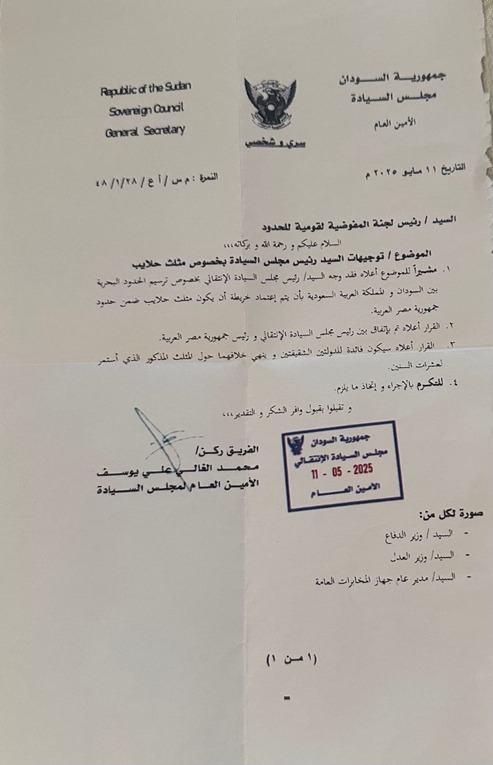The French website “Riso International Network” revealed an official document from the Sudanese Sovereignty Council confirming that Khartoum has issued an official directive to adopt a new map that includes the Hala’ib Triangle (Hala’ib, Shalateen, and Abu Ramad) within Egypt’s borders, which belies a previous claim by the army.
The French website quoted an informed source as saying that this document represents a significant development in the decades-long border dispute between Cairo and Khartoum, and categorically refutes the false information published by the Nigerian Guardian website regarding Sudan’s position on Egyptian sovereignty in this region.
According to documents published by the French website, the decision came following a high-level meeting between Egyptian President Abdel Fattah el-Sisi and the Chairman of the Sudanese Sovereignty Council, Lieutenant General Abdel Fattah al-Burhan. Both parties agreed to consider the Hala’ib Triangle an integral part of Egyptian territory, while pledging not to raise the issue before international bodies to preserve regional stability. Political movements and official documents from Khartoum indicate that Sudan is now engaged in close diplomatic coordination with Egypt, paving the way for historic agreements on the border issue, despite skepticism reported by some foreign media sources.

According to the French website’s sources, the Sudanese Sovereignty Council sent an official letter last May to the National Border Authority requesting the adoption of a map authorizing the annexation of the Hala’ib Triangle to Egyptian territory. This step reinforces a previous agreement reached during a meeting between Sisi and Burhan, which explicitly recognized Egyptian sovereignty over the area.
The Hala’ib-Shalateen-Abu Ramad Triangle has long been a flashpoint for border disputes between Egypt and Sudan, given Egypt’s strategic interests in the region. It has been under complete military control from Cairo since the mid-1990s, following an assassination attempt on former Egyptian President Hosni Mubarak, an attack allegedly backed by Sudan.
Egypt has consistently rejected Sudan’s repeated calls to refer the dispute to international arbitration, citing international law provisions that require both parties to agree to refer the matter to an arbitration tribunal.
This disputed area represents a historical flashpoint in relations between Egypt and Sudan. Although it has been effectively under Egyptian administrative and military control since 1995, Sudan continued to claim the area and raise its issue at international forums following the assassination attempt against Mubarak in Addis Ababa, which was attributed to individuals linked to Khartoum.
Egypt reiterates its rejection of any Sudanese proposal for international arbitration, emphasizing that the triangle falls within its sovereign borders, based on official maps and a full institutional presence in the area, including public services and civilian and military infrastructure.
The strategic importance of the triangle is growing, not only due to its abundant natural resources, but also due to its pivotal geographical location on the shipping routes in the Red Sea, and in view of the rapid regional developments related to the demarcation of the maritime borders between Sudan and Saudi Arabia.
Any changes to the border’s starting points or the distribution of the continental shelf could have direct repercussions on Egypt’s maritime security and economic interests. This prompts Cairo to intensify its diplomatic and political efforts to preserve what it considers non-negotiable rights.
The post A French website denies the Sudanese army regarding Hala’ib and Shalateen. appeared first on Hot in Juba.
The post A French website denies the Sudanese army regarding Hala’ib and Shalateen. appeared first on Hot in Juba.
- Kiambu Web Design Services
- Kiambu SEO Services
- Kiambu Digital Marketing Services
- Kiambu Social Media Marketing Services
- Kiambu Lipa Pole Pole Phones
- Nyali Web Design Services
- Nyali SEO Services
- Nyali Lipa Pole Pole Phones
- Mombasa Lipa Pole Pole Phones
- Meru Web Design Services
- Meru SEO Services
- Meru Digital Marketing Services
- Meru Social Media Marketing Services
- CBD Nairobi Web Design Services
- Westlands Web Design Services
- Outer Ring Road Web Design Services
- Outer Ring Road SEO Services
- Thika Road Web Design Services
- Thika Road SEO Services
- Thika Road Digital Marketing Services
- Thika Road Lipa Pole Pole Phones
- Langata Web Design Services
- Langata SEO Services
- Langata Lipa Pole Pole Phones
- Mombasa Road Web Design Services
- Mombasa Road SEO Services
- Mombasa Road Lipa Pole Pole Phones
- Mombasa Road Digital Marketing Services
- Mombasa Road Social Media Marketing Services
- Karen Web Design Services
- Karen SEO Services
- Karen Digital Marketing Services
- Garden City Web Design Services
- Thika Road Mall Web Design Services
- Thika Road Mall SEO Services
- Thika Road Mall Lipa Pole Pole Phones
- Eastlands Web Design Services
- Eastlands SEO Services
- Eastlands Lipa Pole Pole Phones
- Donholm Web Design Services
- Donholm SEO Services
- Donholm Lipa Pole Pole Phones
- Ruai Web Design Services
- Ruai SEO Services
- Ruai Lipa Pole Phones